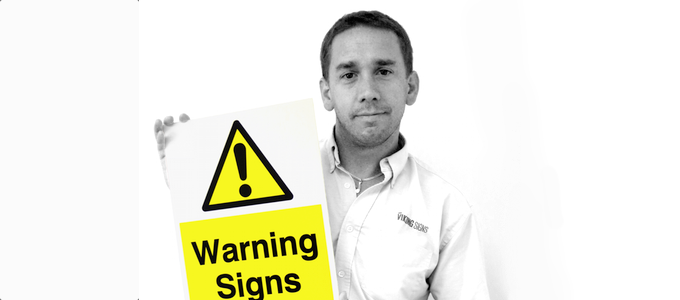Hello. I’m Darren Joint, the Managing Director of Viking Signs.
How do you grow an SME through a recession?
When I arrived at Viking Signs six years ago, the business had expanded from a back room operation to a thriving small enterprise – the challenge now, was not just how to survive the recession, but to actually grow through it. Success meant finding a way to scale the business whilst keeping hold of our service levels. In other words, we knew customers came back to Viking because of our great personal service – how could I look after more customers to just the same standard?
My experience during a decade working in the high-tech engineering industry, (mostly with Ford Motor Company) told me that the answer was in the “system”. I was sure that I could apply some of that big corporate thinking, in a smaller scalable way, to create a systematic process allowing instant customisation, with very short lead times.
[blockquote]The aim? For Viking Signs to deliver exactly what each customer needs, exactly when they need it. And to be able to do this time and time again, for an ever increasing number of customers.[/blockquote]
So how do I offer 30,000 different signs without needing a warehouse to keep them in?
Our customers expect to be able to order and receive their signs very quickly. Most safety sign manufacturers have to hold vast stocks – and it’s having the right signs available when they’re needed that’s key to their success. But no-one can stock all 30,000 standard size/material sign combinations at one time. I wanted Viking to be the company who was able to offer all those products – every single day, with a same day shipping service. The answer? To manufacture them ourselves – on demand.
Could I convince our customers that we could make their sign from scratch as quickly as our competitors could take it off the shelves?
[pullquote]The only way to convince people, is to do it – time and time again[/pullquote].
The only way to convince people, is to do it – time and time again. In the automotive industry, I witnessed a game-changing approach to manufacturing. Factories used to hold months’ worth of stock, ready to slot into the production line at the right moment. In the early part of my career, Ford moved to a “just in time” method of manufacturing – where that day’s components only arrived on site that morning. Following Toyota and the the other Japanese carmaker’s lead, this revolutionised the automotive industry. The next logical step Ford took later in my career was introducing “lean manufacturing” again a concept borrowed primarily from Toyota.
I brought just in time, lean manufacturing to Viking Signs, using the same principles. We developed a process of sign making and distribution that proved to our customers that we could make anything, and dispatch it the same day.
After testing the concept, we moved to a 6.5 thousand square foot unit and created our own lean factory. We stocked the common key materials in the safety sign market and bought the most reliable, best supported machines on the market. Now our factory can create, customise and produce any of those 30,000 signs and what’s more – if you order before 1pm, we’ll design, proof, make, check and ship, for same day dispatch.
[blockquote] It’s created a system that’s just as quick as picking a sign off the shelf and posting it – yet it gives our customers total control over the design.[/blockquote]
Is it possible to create a business that can’t make a mistake?
The man behind much of the Toyota Production System, wanted to do just that and invented a mistake proofing system called poka-yoke. It’s something I’ve worked with for years. Poka-yoke is simple: it’s about creating a fail-safe system that’s designed to make mistakes impossible. Standard in high-volume manufacturing, it’s a mindset change from systems of quality checking to minimise mistakes escaping, to thinking in advance how to remove the possibility of a mistake occurring. Since I introduced poka-yoke systems into our business processes, we’ve seen drastic improvements. For instance, rather than stocking 2 types of stainless steel material only to save fractions of pence, we stock the best, most versatile, 316 marine grade material and use this in every case. Your product benefits from a superior material and cannot by mistake, be made on an inferior one. In the design sphere, we use the actual production artwork to produce customer proofs. This means once approved it’s impossible for the wrong design to be made.
All this attention to getting it “right-first-time” has meant we’re able to ship over 20,000 signs per month and have only ever had one order go out the door late. We maintain a 9.6/10 Trustpilot score and achieve a return rate measured in fractions of a percent.
What if this economical manufacturing model could attract more business back to UK shores?
The UK has lost its manufacturing base because of the lack of flexibility in traditionally-run factories combined with the low cost of volume manufacturing overseas.
A growing part of our business is creating customised solutions, tailored to customer needs – manufactured alongside our ‘standard’ production.
Our “lean on demand” model makes it possible to customise and turn around orders on a tight schedule and be competitive.
[blockquote]
If these principles mean we can be entirely flexible, extremely responsive and cost effective – couldn’t more industries find bringing manufacturing back onshore the obvious choice? [/blockquote]
Watch this space!


Leave a Reply
You must be logged in to post a comment.